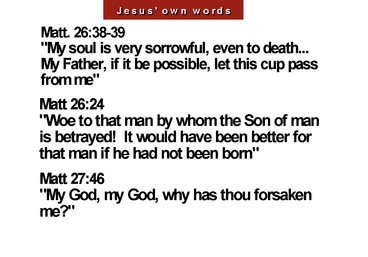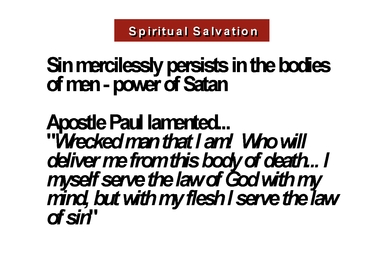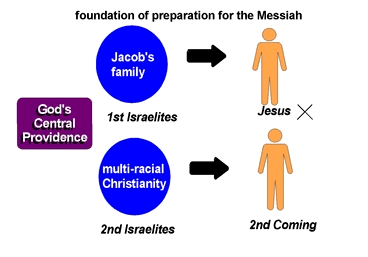
God and Israel

God truly loved the chosen people. He prophesied many times of the coming of the Messiah and warned the people to expect his coming. God also prepared the great John the Baptist, who was to testify to the Messiah for the people of Israel. Thus, the nation of Israel had been truly waiting for the Messiah.
However, tragically, the much-prepared chosen people failed to recognize the Messiah when he came. The Son of God was left with no other choice but to persuade the people himself that he was the Son of God, yet he was not understood, branded as blasphemous, and ultimately crucified. Even Pilate, a pagan ruler, knew of Jesus' innocence, yet ironically the people who condemned Jesus were the chosen people and prepared Jewish leaders themselves. How could this have happened?
The Cross

Christians have traditionally believed that Jesus' death on the cross was the original plan of God. No! This is absolutely false.

It was the Israelite's ignorance of God's will that led to the crucifixion of Jesus. God's will was clearly to lead the chosen people to believe in and accept the Messiah and be saved (John 6:29). The Jewish people did not know who Jesus of Nazareth was, for they even jeered that they would believe in him as savior only if he would come down from the cross, even as he hung dying. John 1: 11 says, "He came to his own home, and his own people received him not." Paul also testified that "none of the rulers of this age understood this; for if they had they would not have crucified the Lord of glory" (I Cor. 2:8).

Christians everywhere today do not know what actually occurred at the time of Jesus. If it was God's will solely to crucify his Son, why did He prepare a chosen people for so long? Wasn't it expressly to protect His Son from a disbelieving world?

In the Garden of Gethsemane, Jesus prayed, "My soul is very sorrowful, even to death ... My Father, if it be possible, let this cup pass from me" (Matt. 26:36-38). Jesus uttered this prayer, not once, but three times. Many Christians today believe that although his mission was to die on the cross, Jesus, out of human weakness, uttered this timid prayer. But, could Jesus Christ, the savior of mankind, utter any prayer out of weakness?
Neither the first Christian martyr, Stephen, nor any of the many martyrs who followed ever prayed from such weakness. Did they ever ask, "Let this cup pass from me" as they were dying? What makes present-day Christians believe that Jesus was weaker than these martyrs? Especially because his sole purpose of coming to this world was to save mankind, why did Jesus pray this way?
Jesus' prayer in the Garden of Gethsemane was not a self-centered or timid prayer, uttered out of fear of dying. Rather, if there were any way-any way at all-that Jesus could have saved mankind, he would have gladly died hundreds of times over. He had been working all his life to accomplish his messianic mission and to realize God's purpose of creation here on earth.
Jesus' heart was so grieved that God's will would have to wait for thousands of years if he died without succeeding in his mission. He also foresaw that his disciples and all of his followers to come-the Christians-would have to go through the same agonizing way of shedding blood as he did on the cross. He also anguished over the troubled future that would befall the people of Israel who had rejected him. Therefore, in the Garden of Gethsemane, Jesus, as a last desperate prayer to God, was really saying: "Even in these desperate circumstances, let me remain on earth so that I can continue my mission, no matter what the price. Show me any way I can do this."
If dying on the cross was predestined by God, why did Jesus say to Judas Iscariot, who betrayed him, "Woe to that man by whom the Son of Man is betrayed! It would have been better for that man if he had not been born" (Matt. 26:24).
Moreover, how can we explain Jesus' cry on the cross, "My God, my God, why hast thou forsaken me?" (Matt. 27:46).

If the crucifixion was the only way God prepared for Jesus, why didn't he feel resounding joy upon successfully completing his mission?
The crucifixion was not God's original will for Jesus, the Son of God; rather, it became God's painful alternative caused by the distrust of the people of Israel.

What would have happened if all the people of Israel believed in Jesus and welcomed and loved him? Most certainly, salvation would have been realized? The purpose of creation would have been accomplished and thereby the Kingdom of Heaven on earth established. The people of Israel would have become the honored central nation of that ideal world and division would never have arisen between Judaism and Christianity nor would either of them have had to undergo the tribulations they have endured. Furthermore, because the will of God would have been done on earth, the Second Coming of Christ would have been totally unnecessary.
Salvation Realized?

To put it clearly, Jesus' crucifixion was only a secondary course of salvation, and provided only spiritual salvation. Because Jesus was neither trusted nor received by the Israelites, God had to pay the price for the sinful distrust of all mankind by giving His only Son to Satan as a ransom. Therefore, Satan could claim Jesus' body. This is why Jesus' precious blood on the cross became the price for the redemption of all mankind.
The Limit of Salvation through Redemption by the Cross
From that point, God could resurrect Jesus and open up a way of spiritual salvation not invaded by Satan. Thus God's only victory was not that of the crucifixion but that of Jesus' resurrection.

As a result, the physical bodies of mankind, which were meant to belong to Jesus through acceptance and love, became subject to Satan's invasion. The only way left open was the way towards spiritual salvation, which could be won by believing in and loving Jesus spiritually and being resurrected spiritually as he was.

Even after Jesus' appearance on earth, the world continues to be ruled by Satan, and sin mercilessly persists in the bodies of men. The Apostle Paul lamented, "Wretched man that I am! Who will deliver me from this body of death? ... 1, of myself serve the law of God with my mind, but with my flesh I serve the law of sin" (Rom. 7:24-25). As a saint, Paul was so devout and full in his love of the Lord, but his flesh continued to be oppressed by sin. Since this is true for all mankind, we are taught to "pray constantly" (Thess. 5:17) to protect us from satanic invasion. Also, we read in I John 1:10, "If we say we have not sinned, we make him a liar," which tells us that mankind is still under the bondage of sin.

Therefore, the Lord must come again to completely liquidate the sins that remain and to establish the Kingdom of Heaven on earth, the purpose of God's creation.

When the people of Israel did not accomplish their mission as the central nation of the dispensation, unable to achieve unity with the Son of God, God began to form the Second Israel: the multiracial Christianity. Therefore Christianity is what God set up worldwide to replace the nation of Israel and, of course, to be the prepared foundation for the Messiah to come. Thus God's central providence shifted from the Israelites and Judaism to Christianity.
For 400 years the early Christians in Rome paid the price through persecution and martyrdom to establish Christianity as the state religion of the Roman Empire and to build a strong foundation. Later, nations such as England and America were established by God as central nations to form the Second Israel of Christianity, which is to be responsible to bring the whole world into unity around God and is the foundation of God's blessing prepared for the Lord of the Second Advent.